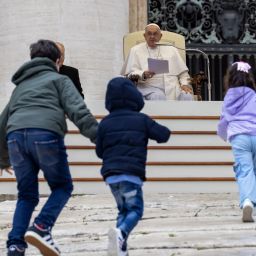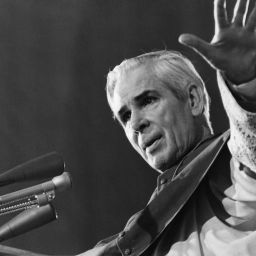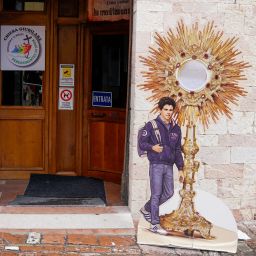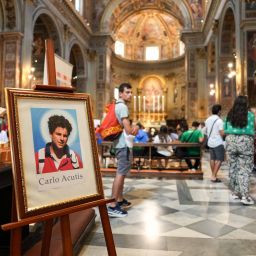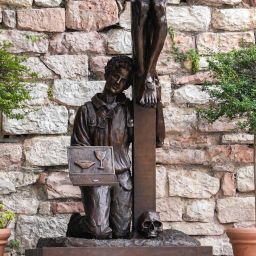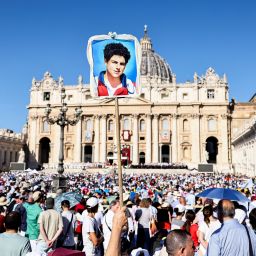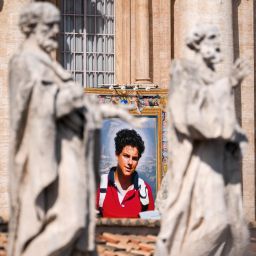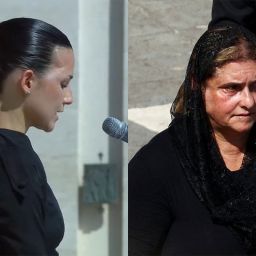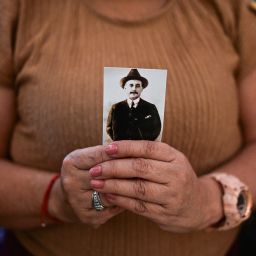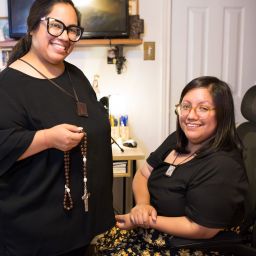By Justin McLellan
Catholic News Service
ASSISI, Italy — For centuries, pilgrims came to Assisi to walk in the footsteps of a saint who preached to birds, embraced poverty, and wandered the hills barefoot.
But today, many arrive in search of a different model of holiness: that of a teenager in Nike sneakers who built websites and coded for Christ.
“I came to Assisi for Carlo,” said Anne-Sophie, a mother of three from France, speaking outside the Church of St. Mary Major in Assisi, where the tomb of Blessed Carlo Acutis draws a steady stream of visitors. “Not only Carlo, but St. Francis, of course,” she added April 1, mentioning the town’s patron saint almost as an afterthought.
Individual devotees, pilgrim groups, and students on school field trips visited Blessed Carlo’s tomb in the church, which stands next to the site where St. Francis famously stripped off his fine clothing to embrace a life poverty.
In the cobbled streets leading to the shrine, souvenir shops that once featured only tau crosses and rustic Franciscan statues now prominently display Carlo’s face on refrigerator magnets and figurines — often in his signature red polo shirt. Listings on Airbnb even advertise their proximity to his tomb, signaling just how quickly Carlo’s presence has become part of the fabric of Assisi.
For Anne-Sophie, Carlo’s rise in popularity among Catholics feels providential. “In the 20th century, we had Saint Thérèse of Lisieux,” she told Catholic News Service, referring to the French mystic who Pope Francis is known to be fond of. “Now, I really believe Carlo will be the saint for the 21st century. He is a big, big chance for us — don’t miss it.”
Carlo, who died of leukemia in 2006 at age 15, was beatified in 2020, and is set to be canonized April 27 during the Jubilee of Teenagers at the Vatican, becoming the Catholic Church’s first “millennial” saint.
In life, he was known for his cheerfulness, his eucharistic devotion, and his talent with computers — traits that have turned him into a spiritual icon for young Catholics and families looking for a saint who seems to belong to their world.
Pope Francis has long held up Carlo as a model for the digital generation. In his 2019 exhortation “Christus Vivit,” published after the Synod of Bishops on young people, the pope wrote that Carlo “knew how to use the new communications technology to transmit the Gospel, to communicate values and beauty,” even while resisting the “consumerism and distraction” that often dominate online life.
Much of Blessed Carlo’s rise is attributed to his appeal to young Catholics, who see in him a figure who not only looks like them but lives like them too.
Antonella Sacchi, who was accompanying a group of Italian high school students to his tomb, told CNS that her students were struck not only by Carlo’s age but by “his normal life, his way of living the Gospel in everyday life.”
“They were fascinated” standing before Blessed Carlo’s tomb, she said. “For them, he doesn’t feel far away.”
The pilgrims April 1 included whole families as well as teachers and catechists hoping to introduce young people to the saint.
For some, Blessed Carlo is an intercessor, not just a model.
Paola Ventre, visiting the tomb with her husband, Massimo, and son, Michele, said she had prayed to Carlo for the grace of becoming a mother. “We had many difficulties,” she said, holding her son in her arms, “but I prayed with insistence, and I believe that thanks to his intercession, our son was given to us with great love.”
For many, Carlo’s appeal lies in the way he lived his holiness: not by founding a religious order or performing public miracles, but by showing extraordinary faith in the midst of an ordinary teenage life. He channeled his interest in coding to create a website cataloging eucharistic miracles around the world, hoping to share his love for the real presence of Jesus in the Eucharist with others.
“He used social media well,” said Silvia Rodarte, a Mexican mother of four visiting Assisi with her husband, Ramón Torres, for their 25th wedding anniversary. “The internet is great, but if it’s misused it’s terrible; and Carlo used it in a wonderful way. In fact, we know about Carlo Acutis due to social media.” The couple learned about Carlo through their daughter, who had seen a video about him online.
Torres said Carlo reminded him of his own son, who is now about the age Carlo was when he died.
The image of a young saint can make young people “feel represented in the values of the Catholic Church,” Torres said. “I feel that he will be an important bridge between the youth, the new generations, and the Church.”
The same internet that Carlo once used to bring others closer to God is now leading people to him.
For Kenny Chan from Sydney, discovering Blessed Carlo online was the beginning of a spiritual friendship that eventually brought him and his fiancé all the way to Assisi.
“We watch him every day on YouTube,” he said, referring to the 24-hour livestream of Carlo’s tomb available online. “Spiritually, if I’m feeling low, I’m having a bad day, I put on YouTube and just talk to him. You can always put a message or a prayer in the chat.”
Carlo’s story may have spread across the globe through screens, but for many pilgrims, it is the encounter with his physical presence — his body, his tomb, the hilltop town where it is located — that makes his spirituality feel tangible and close.
Seeing the tomb in person, Chan said, “is much better.”
“I was here; I could see him in person; so, it’s worth it.”
Cutline for featured image: Statues of St. Francis of Assisi and Blessed Carlo Acutis are seen outside a souvenir shop in Assisi, Italy, April 1, 2025. (CNS photo/Justin McLellan)


